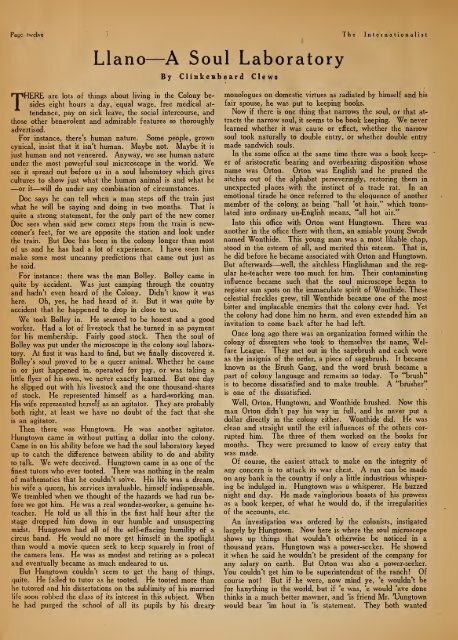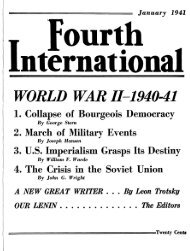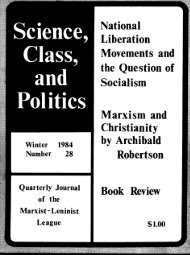Volume 6, No. 2, June, 1918
Volume 6, No. 2, June, 1918
Volume 6, No. 2, June, 1918
Create successful ePaper yourself
Turn your PDF publications into a flip-book with our unique Google optimized e-Paper software.
Page twelve The Internationalist<br />
Llano—A Soul Laboratory<br />
By Clinkenbe ar d Clews<br />
THERE<br />
are lots of things about living in the Colony besides<br />
eight hours a day, equal wage, free medical attendance,<br />
pay on sick leave, the social intercourse, and<br />
those other benevolent and admirable features so thoroughly<br />
advertised.<br />
For instance, there's human nature. Some people, grown<br />
cynical, insist that it isn't human. Maybe not. Maybe it is<br />
just human and not veneered. Anyway, we see human nature<br />
under the most powerful soul micrcoscope in the world. We<br />
see it spread out before us in a soul laboratory which gives<br />
cultures to show just what the human animal is and what he<br />
do under any combination of circumstances.<br />
—or it—will<br />
Doc says he can tell when a man steps off the train just<br />
what he will be saying and doing in two months. That is<br />
quite a strong statement, for the only part of the new comer<br />
Doc sees when said new comer steps from the train is newcomer's<br />
feet, for we are opposite the station and look under<br />
the train. But Doc has been in the colony longer than most<br />
of us and he has had a lot of experience. I have seen him<br />
make some most uncanny predictions that came out just as<br />
he said.<br />
For instance: there was the man Bolley. Bolley came in<br />
quite by accident. Was just camping through the country<br />
and hadn't even heard of the Colony. Didn't know it was<br />
here. Oh, yes, he had heard of it. But it was quite by<br />
accident that he happened to drop in close to us.<br />
We took Bolley in. He seemed to be honest and a good<br />
worker. Had a lot of livestock that he turned in as payment<br />
for his membership. Fairly good stock. Then the soul of<br />
Bolley was put under the microscope in the colony soul laboratory.<br />
At first it was hard to find, but we finally discovered it.<br />
Bolley's soul proved to be a queer animal. Whether he came<br />
in or just happened in, operated for pay, or was taking a<br />
little flyer of his own, we never exactly learned. But one day<br />
he slipped out with his livestock and the one thousand shares<br />
of stock. He represented himself as a hard-working man.<br />
His wife represented herself as an agitator. They are probably<br />
both right, at least we have no doubt of the fact that she<br />
is an agitator.<br />
Then there was Hungtown. He was another agitator.<br />
Hungtown came in without putting a dollar into the colony.<br />
Came in on his ability before we had the soul laboratory keyed<br />
up to catch the difference between ability to do and ability<br />
to talk. We were deceived. Hungtown came in as one of the<br />
finest tutors who ever tooted. There was nothing in the realm<br />
of mathematics that he couldn't solve. His life was a dream,<br />
his wife a queen, his services invaluable, himself indispensable.<br />
We trembled when we thought of the hazards we had run before<br />
we got him. He was a real wonder-worker, a genuine heteacher.<br />
He told us all this in the first half hour after the<br />
stage dropped him down in our humble and unsuspecting<br />
midst. Hungtown had all of the self-effacing humility of a<br />
circus band. He would no more get himself in the spotlight<br />
than would a movie queen seek to keep squarely in front of<br />
the camera lens. He was as modest and retiring as a polecat<br />
and eventually became as much endeared to us.<br />
But Hungtown couldn't seem to get the hang of things,<br />
quite. He failed to tutor as he tooted. He tooted more than<br />
he tutored and his dissertations on the sublimity of his married<br />
life soon robbed the class of its interest in this subject. When<br />
he had purged the school of all its pupils by his drearymonologues<br />
on domestic virtues as radiated by himself and his<br />
fair spouse, he was put to keeping books.<br />
<strong>No</strong>w if there is one thing that narrows the soul, or that attracts<br />
the narrow soul, it seems to be book keeping. We never<br />
learned whether it was cause or effect, whether the narrow<br />
soul took naturally to double entry, or whether double entry<br />
made sandwich souls.<br />
In the same office at the same time there was a book keeper<br />
of aristocratic bearing and overbearing disposition whose<br />
name was Orton. Orton was English and he pruned the<br />
aitches out of the alphabet perseveringly, restoring them in<br />
unexpected plaoes with the instinct of a trade rat. In an<br />
emotional tirade he once referred to<br />
the eloquence of another<br />
member of the colony, as being "hall 'ot hair," which translated<br />
into ordinary un-English means, "all hot air."<br />
Into this office with Orton went Hungtown. There was<br />
another in the office there with them, an amiable young Swede<br />
named Wonthide. This young man was a most likable chap,<br />
stood in the esteem of all, and merited this esteem. That is,<br />
he did before he became associated with Orton and Hungtown.<br />
But afterwards—well, the aitchless Hinglishman and the regular<br />
he-teacher were too much for. him. Their contaminating<br />
influence became such that the soul microscope began to<br />
register sun spots on the immaculate spirit of Wonthide. These<br />
celestial freckles grew, till Wonthide became one of the most<br />
bitter and implacable enemies that the colony ever had. Yet<br />
the colony had done him no harm, and even extended him an<br />
invitation to come back after he had left.<br />
Once long ago there was an organization formed within the<br />
colony of dissenters who took to themselves the name, Welfare<br />
League. They met out in the sagebrush and each wore<br />
as the insignia of the order, a piece of sagebrush. It became<br />
known as the Brush Gang, and the word brush became a<br />
part of colony language and remains so today. To "brush"<br />
is to become dissatisfied and to make trouble. A "brusher"<br />
is one of the dissatisfied.<br />
Well, Orton, Hungtown, and Wonthide brushed. <strong>No</strong>w this<br />
man Orton didn't pay his way in full, and he never put a<br />
dollar directly in the colony either. Wonthide did. He was<br />
clean and straight until the evil influences of the others corrupted<br />
him. The three of them worked on the books for<br />
months. They were presumed to know of every entry that<br />
was made.<br />
Of course, the easiest attack to make on the integrity of<br />
any concern is to attack its war chest. A run can be made<br />
on any bank in the country if only a little industrious whispering<br />
be indulged in. Hungtown was a whisperer. He buzzed<br />
night and day. He made vainglorious boasts of his prowess<br />
as a book keeper, of what he would do, if the irregularities<br />
of the accounts, etc.<br />
An investigation was ordered by the colonists, instigated<br />
largely by Hungtown. <strong>No</strong>w here is where the soul microscope<br />
shows up things that wouldn't otherwise be noticed in a<br />
thousand years. Hungtown was a power-seeker. He showed<br />
it when he said he wouldn't be president of the company for<br />
any salary on earth. But Orton was also a power-seeker.<br />
You couldn't get him to be superintendent of" the ranch! Of<br />
course not! But if he were, now mind ye, 'e wouldn't be<br />
for hanything in the world, but if 'e was, 'e would 'ave done<br />
thinks in a much better mawner, and 'is friend Mr. 'Uungtown<br />
would bear 'im hout in 'is statement. They both wanted
















